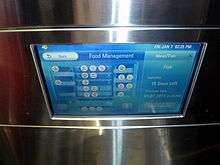Smart refrigerator
Smart refrigerator, also known as internet refrigerator, is a refrigerator which has been programmed to sense what kinds of products are being stored inside it and keep a track of the stock through barcode or RFID scanning. This kind of refrigerator is often equipped to determine itself whenever a food item needs to be replenished.

History
By the late 1990s and the early 2000s, the idea of connecting home appliances to the internet (Internet of Things) had been popularized and was seen as the next big thing. In June 2000, LG launched the world’s first internet refrigerator, the Internet Digital DIOS. This refrigerator was an unsuccessful product because the consumers had seen it as unnecessary and expensive (more than $20,000).
Controversy
Security
In 2000, Russian anti-virus company Kaspersky Lab warned that in a few years Internet-connected fridges and other household appliances may be targets of net viruses, such as ones that could be designed to make your fridge door swing open in the middle of the night.[1] In January 2014, the California security firm Proofpoint, Inc. announced that it discovered a large “botnet” which infected an internet-connected refrigerator, as well as other home appliances, and then delivered more than 750,000 malicious emails.[2] In August 2015, security company Pen Test Partners discovered a vulnerability in the internet-connected refrigerator Samsung model RF28HMELBSR that can be exploited to steal Gmail users' login credentials.[3]
Examples
|
|
Popular culture
- The 2000 film The 6th Day, features an Internet refrigerator which informs Arnold Schwarzenegger that the milk is over its expiring date and asks him to confirm a new order.
- The 2004 film The Stepford Wives, features a smart fridge that can tell whenever it has no juice, etc. in Joanna's new Stepford home.
- The 2012 film Total Recall, features a smart refrigerator that is covered by a touchscreen which enables the user to leave notes and messages.
- Silicon Valley features a smart fridge that is bought by Jian-Yang, after the old fridge broke down in Season 4 episode, "The Patent Troll". The smart fridge is able to communicate in friendly male voice and give a warning if the food items are expired, which bothers Gilfoyle enough to hack it. In season 4 finale, "Server Error", thanks to his hacking, Pied Piper's plan for the new Internet is proven by the 30,000 smart fridges connected together that create the new Internet, as he hacked using some of their code, replacing his dead server, Anton, who backed itself up to the smart fridge before it died.
References
- Harrison, Linda (21 June 2000). "Fridges to be hit by Net viruses". The Register. Retrieved 23 October 2016.
- "Fridge sends spam emails as attack hits smart gadgets". BBC News. 17 January 2014. Retrieved 23 October 2016.
- Neagle, Colin (26 August 2015). "Smart refrigerator hack exposes Gmail account credentials". Network World. Retrieved 23 October 2016.
- Limer, Eric (9 December 2015). "Hilarious Tech Support Thread Reveals the True Horror of a Smart Home". Popular Mechanics. Retrieved 23 October 2016.
- Franceschi-Bicchierai, Lorenzo (11 December 2015). "Smart Fridge Only Capable of Displaying Buggy Future of the Internet of Things". Motherboard. Retrieved 23 October 2016.
External links
- "What Is a Smart Refrigerator?". Wise Geek.
- Bennett, Bill (23 August 2009). "What happened to the internet fridge?". Technology News. New Zealand.